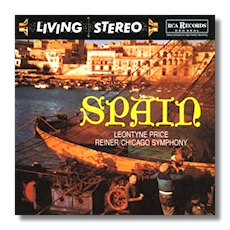
The Internet's Premier Classical Music Source
Related Links
-
Albéniz Reviews
Falla Reviews
Granados Reviews - Latest Reviews
- More Reviews
-
By Composer
-
Collections
DVD & Blu-ray
Books
Concert Reviews
Articles/Interviews
Software
Audio
Search Amazon
Recommended Links
Site News
 CD Review
CD Review
Spain

- Manuel de Falla:
- El Amor Brujo *
- La Vida Breve: Interlude and Dance
- El Sombrero de Tres Picos: Dances
- Enrique Granados: Goyescas – Intermezzo
- Isaac Albéniz:
- Navarra
- Ibéria – Fête-Dieu à Séville
- Ibéria – Triana
* Leontyne Price, soprano
Chicago Symphony Orchestra/Fritz Reiner
RCA RCD1-5404 70:44
Also released on Hybrid Multichannel SACD RCA 704607








Summary for the Busy Executive: Reiner, el brujo.
Every so often, a certain segment of the classical-music public (one to which I belong, incidentally) wonders why record labels withdraw classic performances in favor of bland readings by new, relatively untried conductors. It would seem to make more economic sense to exploit proven gems already in the catalogue.
Well, now somebody has actually listened to the complaints. ArkivMusic has negotiated with the recording industry and can legitimately re-issue one set of classics after another. They list over 5000 CDs at their web site. It's nice to be able to indulge one's habit without having to skulk around. I hope ArkivMusic makes a ton of money off this. I hope collectors will support the effort, otherwise why listen to us at all?
Let's just get this out of the way first: Reiner and Price's El Amor Brujo is the finest recording of the work to date, a landmark of the stereo era. It first appeared on a Living Stereo LP, which I bought almost as soon as it came out. It seemed more a showcase for Price than the Chicago, especially since the company bundled it with Berlioz's Les nuits d'été, all arranged for soprano, of course. To some extent, both Reiner and Price have suffered an eclipse of public notice. When I was a boy, I thought Reiner and his Chicago the second-greatest orchestra in the world (after my home-town team, of course – Szell and the Cleveland). In many ways, Reiner and Szell took a similar approach to conducting, which probably spurred my admiration for Reiner. Both worried over details. They weren't especially "singing" conductors. Rather, both emphasized rhythm and texture. Price's heyday came in the late Fifties and lasted through the Sixties. I preferred her early to late, but in any case she was a vocal phenom: a lyric soprano with solid low tones. The character of her voice changed as she tackled the heavier Verdi roles from that of incredible sweetness to the cry of eagles. As her early recording of Barber's Hermit Songs with the composer at the piano shows, she could have become a great Lieder singer (and starved to death). She had musical smarts and a grown-up sensibility in abundance. Always, fortunately, she also had the ability to communicate the drama of a text: a born opera singer if ever there was one.
What makes this Brujo so special? First, you have the Chicago and that glorious sound whipped into a great lather by Reiner. Second, this happens to be one of Price's best recordings. Falla wrote the part for a mezzo, but Price used this to her advantage, digging deep into her chest register for groans and moans. She sounds less like an opera singer and more like a flamenco singer under the demonic spell of the duende. With Price, you have the dark and the dirt and the hot Spanish sun. In comparison, other versions sound as if Margaret Dumont's in the audience.
If El Amor Brujo constitutes the main reason to buy the disc, you get a lot of first-class gravy as well. Reiner's account of the Interlude and Dance from Falla's opera La vida breve makes magic – no other word for it. The opening alone seems to come from under the hill. Reiner's Albéniz and Granados take back seats to nobody.
And, by the way, ArkivMusic also sells Reiner and Price's Les nuits, coupled with the best performance (Munch's and the Boston) of Berlioz's L'enfance du Christ.
Copyright © 2007, Steve Schwartz












